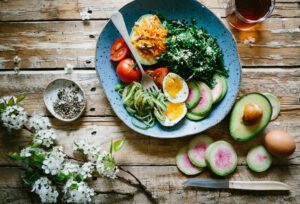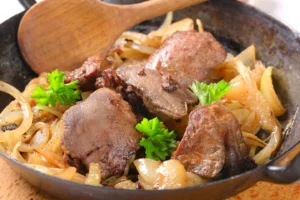
When our immune system is activated, we experience “symptoms.” For example, when we sprain or strain an ankle, we feel and see the immune response in the discomfort, redness, and swelling. This is due to the way our immune system is mobilised to deal with the pathogen or injury. There are other types of immune responses that are natural that are more subtle in symptomatology, involved in the daily functioning of our body. These immune responses are necessary and natural.
问题在于,当我们开始经常出现不同程度的免疫反应症状时。在我们的社会中,这个问题越来越严重,尤其是当你看到统计数字时,就会觉得相当可怕。我们已经看到了这对我们的医疗保健系统造成的负面影响。那么,如果仅仅通过食物就能支持身体的自然免疫反应,会怎样呢?我们在这里进行了研究...
首先,我们来解释一下什么是免疫反应:
Immune responses are part of the natural healing process—when you tear a muscle or catch a cold, your immune system kicks into gear, sending your white blood cells to fight off infection, bacteria, and viruses. A chronically activated immune response, on the other hand, is now thought to be the single biggest contributor to degenerative conditions. This can occur anywhere in the body and is not just isolated to joints and muscles. Additionally, when our weight and adipose body mass are not well managed, we can experience this continuous immune activation, and this is now thought of as the root cause of issues with metabolism, blood flow, and the health of our arterial walls and heart. We do not have to be technically “overweight” to experience this; many people who look slim may have too much in the way of adipose tissue around their organs, and this is just as problematic.
In recent years it has been found that some foods can trigger the type of immune response where the immune system starts attacking healthy tissue (although this can be viewed as being like many other immune responses—where the immune system is still just trying to deal with a threat and the damage to native tissue is merely collateral). Other early symptoms can include digestive dysfunction, joint and muscle tension, extreme and consistent levels of tiredness, head tension, metabolic issues, and sinus and respiratory problems.
It is important to note that all immune response issues should be properly diagnosed by your professional healthcare team to rule out anything serious.
那么,遵循特定的饮食习惯能支持健康的免疫反应吗?
简短的回答是?是的......不过我们更愿意将其视为一种指导原则,而不是严格的饮食习惯。现实情况是,有些食物会因影响肠道和免疫系统而引发免疫反应,而有些食物则会在体内产生有毒代谢物。我们都很熟悉,有些人可能会因为花生、蛋清、小麦、鱼和乳制品等食物中的蛋白质而出现更极端的问题,但也有很多食物可能会引发一些不会危及生命的症状;这些食物可能会让我们中的大多数人大吃一惊。

什么是饮食 "指南"?
Keeping your blood pH balanced through eating a whole food, animal-based diet can help. While “plant-based” and “clean eating” are the new catchphrases, there really is no scientific evidence to suggest that a plant-based or vegan diet can prevent inflammation or chronic disease. “Clean eating” is touted as eating lots of plant foods, but it really should be about eating the diet that provides you with the right nutrients as a 智人 and the appropriate energy for your lifestyle. Plant foods may not be as “clean” as you think.
Plants make secondary metabolites, like lectins, oxalates, phytates, saponins, and tannins, that are designed to protect the plants from being infected or eaten, and many of these are toxic to humans, either straight away, as in the case of cicutoxin in water hemlock, or over a longer period, as with oxalate deposits in joints or gluten for coeliacs. Some plant forms of nutrients, for example, require conversion to useable forms in the body, which is poor to non-existent in some people, and the nutrients that are in plant foods are much harder to extract in our digestive tracts.
But you do not have to be a celiac to experience an unhealthy immune response from eating plant metabolites. For example, too much fibre has been shown to exacerbate pouches in the colon, oxalic acid can settle in joint tissue, causing a consistent immune response, and many whole grains, beans, and vegetables contain lectins, which have been linked to neurological problems, and that can be immediately toxic, as in the case of kidney beans. Unsurprisingly, many people with all manner of serious immune response issues find relief by removing many or all plant foods until they feel better.
On the other hand, some secondary metabolites in plants can help medicinally, as antioxidants, antimicrobials, and carminatives, among many others. Adding foods like berries and fermented veggies, or using culinary herbs, MAY help, but there is no scientific evidence to suggest that more = better. Perhaps a little goes a long way.
需要注意的是:这并不是说传统疗法中使用的草药无效,这些草药通常是因人而异的,对特定的组织/器官有支持作用,在过去的岁月里帮助了数百万人。
有时,与其说你在吃什么,不如说你没有吃什么!
应避免/限制的食物
- 垃圾和超加工 "食品"
- 种子油/植物油(极易诱发--由于其有毒代谢物和工业加工过程,应始终避免食用。由于亚油酸含量较高,即使是冷榨油也应少吃)
- 外卖食品--含有反式脂肪,大多用有害的种子油炸制
- 人造甜味剂
- 精制面粉和糖
- 假肉类和经过大量加工的肉类(对于健康人来说,传统的腊肠、腊肉等是可以的)
- 非传统烹制(排毒)的全谷物、种子、坚果和豆类
- 谷物、饼干、面食、大量生产的面包、蛋糕、糕点、薯片、糖果等。
- 工业加工乳制品
- 任何您不能接受(或不喜欢)的蔬菜或水果
应优先考虑的食物
Overall, animal foods are full of bioavailable nutrients with many either limited in or absent from plants. Organ meats like liver, kidneys, and heart, and shellfish (organs of the sea) are so rich in bioavailable nutrients that they probably should be considered the only true superfoods, with eggs not far behind. Even a steak contains more assimilable nutrition than kale or broccoli. Much of what we’re told about the “dangers” of traditional foods like red meat and animal fats doesn’t hold up to close scientific scrutiny. Traditional or raw dairy products have been shown to calm down an overactive immune response, whereas modern, processed dairy will do the opposite. Research on red meat in regard to immune health has shown positive outcomes, even stronger than fish, which might surprise many.

文化比较
While there are few traditional cultures left, they are known to have very little in the way of unhealthy or chronic immune responses. Those who are still on their hunter/gatherer diets rarely see anything like the issues we face as westerners. These cultures prioritise animal foods, including organs, seafood, and raw dairy products, with a few select, detoxified plant foods, and all of them eat what we would call a whole food diet, devoid of ultra-processed foods. To many traditional societies, plants are seasonal or even “fallback” foods unless they serve an actual nutritional purpose.
On the flip side, in countries where processed foods are plentiful and diets consist of high amounts of refined foods, grains, sugar, ultra-processed dairy, and seed/vegetable oils, and junk/treat “foods,” heightened and consistent immune response issues are very common. China and other countries in Asia have traditionally seen very low rates, but as they add in increasing amounts of junk foods and vegetable oils like soybean oil, this has changed dramatically. Could it be that the foods of modern civilisation are partly to blame? Weston A. Price came to that conclusion in the 1930s, and the two foundations devoted to analysing and disseminating his 10 years of global research are a great source of dietary information.
还有什么能帮上忙的吗?
除了饮食之外,生活方式也是支持健康免疫反应的因素。尽可能多地获取自然光(反之,尽可能少地获取人造光!)、良好的睡眠、良好地应对压力、亲近自然、接地气、使用冷/热/红外线疗法、每天进行适当的运动和锻炼,以及与家庭/社区保持密切联系,这些都有助于健康长寿。这些都是健康的传统文化每天都在做的事情。
No one wants to have a body where the immune response is always “on.”. The good news is that there are many practices you can try that can support your body to find balance. The key is to find what works for you but also to follow what works for us as human beings.
TAPSPP1478
